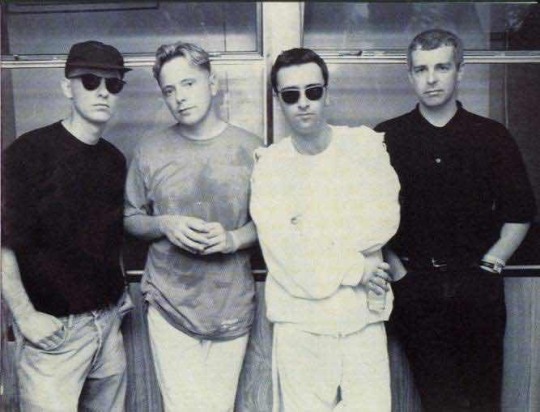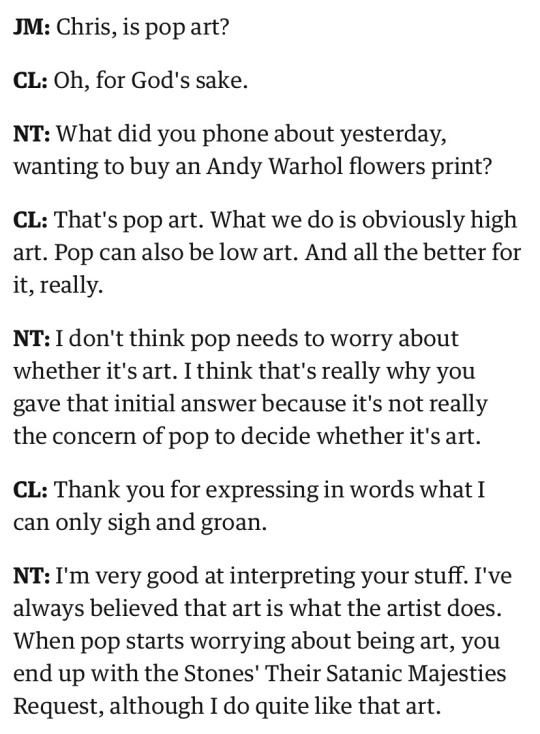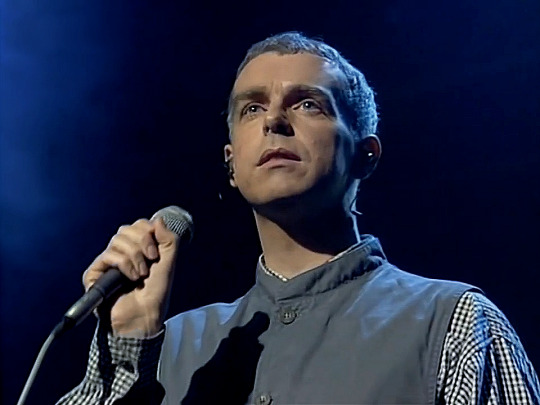#Neil Marrs
Text



Back stage after Cities in the Park 4th of August 1991, at Heaton Park, Manchester
#i might be the only one interested but the first pic is swag i swear (help my brainrot stop)#errr well this turned into a johnny post sry#furthering the electronic photo archives 👌#electronic band#electronic#pet shop boys#neil tennant#chris lowe#johnny marr#bernard sumner#1990s#1991
74 notes
·
View notes
Text

Neil sang getting away with it at Johnny Marr's concert tonight at Hammersmith Apollo
11 notes
·
View notes
Video
youtube
"Disappointed" is the fourth single released by English alternative dance group Electronic.Like their first single "Getting Away with It", it features Neil Tennant of the Pet Shop Boys as well as founding members Johnny Marr and Bernard Sumner.
It was released on 22 June 1992 on Parlophone soon after the demise of Factory Records.
The single was assigned the Factory catalogue number FAC 348, and the logo of the label remained on the artwork.Upon the song's release, it reached the top 20 in Germany, Greece, Ireland, Portugal, Sweden, and the United Kingdom.
It also peaked within the top 10 on three US Billboard charts - US Dance Club Play, US Maxi-Singles Sales & US Modern Rock Tracks.In July 1992, the song was featured in the soundtrack of the live-action/animation hybrid mystery movie Cool World and its inclusion both in the film and on its soundtrack album was advertised on the US single release.
The song was based on a piano riff by Marr's brother Ian; and worked up into a full backing-track by Johnny Marr and Bernard Sumner.They decided to ask Neil Tennant to complete the song and he wrote the lyrics and vocal melody.Some of the words ("Disenchanted once more...") were partly inspired by Mylène Farmer's 1991 hit "Désenchantée".
Tennant travelled to Manchester to record the lead vocal and a few weeks later went to Paris to attend the final mix of the song by Stephen Hague."Disappointed" was conceived just before the recording of New Order's sixth studio album Republic, and was performed live in December 1991 on Electronic's European tour: in Glasgow (sung by Bernard Sumner) and in London (sung by Tennant when Pet Shop Boys guested on three songs).
"Disappointed" was the last Electronic single to be released on all four major formats (7-inch, 12-inch, CD, and cassette).The content of the single was more dynamic than its predecessors, however; it had only one remix of the A-side (by 808 State; titled "808 Mix" in the US and "12-inch remix" in the UK), an additional treatment of a 1991 album track ("Idiot Country", with Ultimatum), and an earlier mix of "Disappointed" (called "Electronic Mix" in the US).The A-side of the single is itself a remix since producer Stephen Hague reworked the "Original Mix" for single release.
Although Electronic would enjoy three more top-twenty singles in the United Kingdom, "Disappointed" was the last major commercial success for the band on an international level, becoming a dance chart hit in the United States and reaching the top 20 in Germany as well as number six in the UK, their highest-charting effort there.
Until the release of Get the Message – The Best of Electronic in 2006, the track was not available on an Electronic album release.
However, since "Disappointed" was featured in the 1992 film Cool World, the song was available on the soundtrack album Songs from the Cool World.Roger Morton of NME was negative in his review, calling the song "effortless in the worse sense" and one that "drifts off into a no man's land of half-hearted disco miserablism".
He commented that Sumner and Marr "have programmed in the garagey synth lines and soft pedal Italian piano, and left out any semblance of melody", while Tennant "murmurs a few lugubrious lines with the enthusiasm of a narcoleptic jellyfish".
Andrew Mueller of Melody Maker felt it "sounds as if minimum effort was exerted over its creation" and concluded, "This sounds like a Pet Shop Boys album track. This yaws where they have stretched.”
"Electronic - Disappointed (Official Music Video) [HD Upgrade]
#youtube#electronic#bernardsumner#bernard sumner#johnnymarr#johnny marr#neiltennant#neil tennant#petshopboys#pet shop boys#neworder#new order#thesmiths#the smiths
10 notes
·
View notes
Text
Does anyone have any guesses for what the new Getting Away With It lyrics are? (You can hear them here.) I tried transcribing them but Neil is really mumbly during that section, parts I'm not confident on are in brackets:
1989
Manchester [pull down the line]
1989
1989
House piano and a new baseline
1989
1989
Change of [view/mood] for a different time
1989
1989
Manchester [all down the line]
1989
#Please help I want to know what he's saying#Johnny Marr#Neil Tennant#Getting Away With It#Electronic band#Pet Shop Boys#Sid posts
4 notes
·
View notes
Text
youtube
Electronic - Getting Away With It
*This song came on the radio last night in my car and I took a picture of my dashboard because it reminded me of New Order and I wanted to remember it for later. I was delighted (but also felt very dumb) to learn from the DJ when it ended that Electronic was a super group made up of Bernard Sumner of New Order, Neil Tennant of The Pet Shop Boys and Johnny Marr from The Smiths. I love all those bands and was not aware of their super group. Thank you WFUV 90.7.
4 notes
·
View notes
Video
youtube
Electronic-Getting away with it
#youtube#video#music#alternative#live#electronic#getting away with it#old#bernard sumner#neil tennant#johnny marr#synth
5 notes
·
View notes
Text

chris and neil interviewed by johnny marr
49 notes
·
View notes
Text
so I was randomly looking on yt and found THIS. like imagine my surprise when I found out Johnny Marr made remixes. anyways, this is so good..giving electronic vibes ngl
youtube
9 notes
·
View notes
Text
tom song!!!! TOM SONG
however i look it’s clear to see that i love you more than you love me
#tom wambsgans#neil tennant and johnny marr trying to write a morrissey send up#and coming up with the best lyrics either of them ever did#they tried it !#Spotify
5 notes
·
View notes
Photo



— “Disappointed” by Electronic on Top of the Pops (1992)
#couldn't get a good shot of johnny so apologies it's just his hands and guitar aljdfa#electronic#neil tennant#bernard sumner#johnny marr#pet shop boys#this soooooooooooooong. neil really did that#neil's songs about his boyfriend: hiiiiiiii
78 notes
·
View notes
Video
youtube
"Getting Away with It" is the first single by the English band Electronic, which comprised Bernard Sumner of New Order, ex-Smiths guitarist Johnny Marr, and guesting vocalist Neil Tennant of the Pet Shop Boys.
It was first released in 1989.
Musically, Bernard Sumner wrote the verse and Johnny Marr wrote the chorus.
The lyrics, co-written by Tennant with Sumner, are a parody of Marr's Smiths partner Morrissey, and his public stereotyping as morose and masochistic (Pet Shop Boys would further satirise this trend on their 1990 song "Miserablism").
Morrissey, for his part, criticized the song in a 1991 interview, calling it "totally useless" and joking that the song had a "very apt title".
In a 2021 interview with Music Radar, Marr revealed that Chris Lowe also worked on the track, citing the bassline as his work.
ABC and The The, Drummer David Palmer programmed the track's drums.
Two music videos were made for "Getting Away with It".
The first, directed by Chris Marker and produced by Michael Shamberg for European use in 1989, featured Sumner, Marr and Tennant in a studio environment miming to the single edit of the song.
Additional footage of Marker's muse Catherine Belkhodja, strolling among peacocks through Paris Zoo and also singing to the track, was left out.
The second video, shot in 1990, was made for the US release.
Sumner and Tennant appeared, alternately, against a series of coloured backgrounds, with artistic effects superimposed.
Two women's faces are also panned in close-up.
The later version is available on the 2006 Get the Message DVD.
Electronic - Getting Away With It (1990 Official Music Video) [HD Upgrade]
#electronic#bernardsumner#bernard sumner#johnnymarr#johnny marr#neiltennant#neil tennant#petshopboys#pet shop boys#chrislowe#chris lowe#neworder#new order#thesmiths#the smiths
6 notes
·
View notes
Text
Pet Shop Boys Box Set Review: Smash: The Singles 1985-2020

(Parlophone)
BY JORDAN MAINZER
“It’s in the music / It’s in the song,” sings Neil Tennant on Pet Shop Boys’ “Vocal”, a 2010s club banger about the power of a communal groove. It’s a simple, but appropriate summation of their new box set Smash: The Singles 1985-2020. A collection of 55 remastered tracks, from the band’s “Imperial Phase” to their surprising late-career critical success, Smash makes the case for the London synth pop duo as some of the most concisely affecting pop songwriters of all time. Though each track sounds crisp and timeless, the set’s improved audio quality is secondary to the strength of the collection as a whole, one that puts the the band’s idiosyncratic, lesser-known songs on the same pedestal as their massive hits.
The casual music fan and non-PSB-diehard is likely familiar with, at the very least, the ever-relevant “West End Girls”. A perfect slice of deadpanned, Thatcher-era pop, it’s a predecessor to Pulp’s “Common People”, a satire of our penchant to fetishize those of a different socioeconomic status. That the band’s tone isn’t obvious is perhaps their greatest trick--from the get-go, they fully embraced commercialism while singing about the suburban hellscapes brought upon by capitalism (“Suburbia”) and society’s swindlers (“Opportunities (Let’s Make Lots of Money)”. To Tennant and Chris Lowe, though, this wasn’t hypocrisy: It was the perfect melding of the minds, the former’s pop songwriting chops with the latter’s artistic, experimental edge. Take “Love Comes Quickly”, which wouldn’t hit as hard without its Reichian choral background, panning synths, and Tennant’s croon-to-falsetto from which you can trace a direct line to the likes of Hot Chip’s Alexis Taylor. Ditto the band’s inspired disco-ifed covers of songs from other genres: Brenda Lee’s “Always On My Mind”, the whistling synths emulating pedal steel guitar, or U2 and Boys Town Gang mashup “Where The Streets Have No Name/I Can’t Take My Eyes Off You”.
What you perhaps come to appreciate most about Pet Shop Boys from Smash is how many of their club-conquering songs take place in intimate settings. For every horn-inflected, Latin pop jam like “Domino Dancing”, there’s the unspoken infidelity of “So Hard” or the paranoid obsession of “Jealousy”, lovers waiting for the other to come home from being out. On the surface, “Se a Vida É (That’s the Way Life Is)” sounds basic, but it’s a thoughtful reflection on the complications of life and how they change as you age, all atop a brass section, strummed guitars, and percussive drums from SheBoom. And even on a certain dance song like “I Wouldn’t Normally Do This Kind of Thing”, the narrator spends most of the time in their own head, thinking about their journey from getting out of their comfort zone to letting loose on the floor.
Of course, at the heart of the band’s introspection is an unavoidable societal context. Pet Shop Boys came to fruition in an age of state-sanctioned homophobia, governmental response to AIDS met with, at best, a shrug, and at worst, demonization. Tennant came out as gay in a 1994 interview in Attitude magazine, and before that, his references to his sexual orientation in song were somewhat veiled. On early religious satire “It’s a Sin”, Tennant laments being blamed “for everything I long to do / No matter when or where or who”. The stunning, whispered eulogy “Being Boring” is about a friend of his who died from AIDS; sullen, he sings, “All the people I was kissing / Some are here and some are missing.” You can hear the difference in songs with similar themes after Tennant came out; on “I Don’t Know What You Want But I Can’t Give It Anymore”, he theatrically leans into the jealousy, chanting over wailing backing vocals, “Is he better than me? Was it your place or his? Who was there?” And while the famously understated Lowe has never publicly come out, it’s long been speculated that his added verse on “Paninaro ‘95″ refers to an ex lover who passed from AIDS. The band’s inclusion of this version over the original on Smash speaks volumes, given the disgusting rise of anti-LGBTQ+ legislation today.
Ultimately, what allowed Pet Shop Boys to continue succeeding, as society’s attitudes and tastes changed, is their adaptation. A diss track like “Yesterday, When I Was Mad” represents Tennant at his most bitter, chiding critics. “You have a certain quality, which really is unique / Expressionless, such irony, although your voice is weak,” he sings, putting himself in the mindset of a stuffy journalist unamused by a track like, say, “Left to My Own Devices”. Over two decades later, on “The Pop Kids”, Tennant adopts a different mindset rife with humility thinking about the band’s early days: “We were young but imagined we were so sophisticated / Telling everyone we know that rock was overrated.” It’s those very rock-oriented elements that, ironically, comprised their best later-career tunes. Ali McLeod’s guitar and BJ Cole’s pedal steel stand out on “You Only Tell Me You Love Me When You’re Drunk”, a moment inspiring to polymaths like Death Cab For Cutie guitarist Dave Depper. The Smiths’ Johnny Marr provides guitar on “Home And Dry”, whose additional snares and seaside synths fit alongside Tennant’s autotuned vocals on the band’s most wistful track. And acoustic guitar from Tennant himself buoys “I Get Along” and the Xenomania-produced “Did You See Me Coming?” They’re the type of songs that make you think were age truly nothing but a number, you’d be looking at a second collection of eternal songs in another 35 years.
youtube
#album review#pet shop boys#bj cole#smash: the singles 1985-2020#parlophone#neil tennant#pulp#chris lowe#hot chip#alexis taylor#brenda lee#u2#boys town gang#sheboom#attitude#ali mcleod#death cab for cutie#dave depper#the smiths#johnny marr#xenomania
2 notes
·
View notes
Text

Label, Estate: Sinéad O’Connor Would be “Disgusted, Hurt and Insulted” by Fascist’s Use of Her Song
- “We demand that (Rhymes with Fondled Dump) and his associates desist from using her music immediately,” they say
The late Sinéad O’Connor “would have been disgusted, hurt and insulted” by a Florida-based fascist using her music at his cult gatherings, O’Conner’s estate and Chrysalis Records said in a statement carried by Billboard magazine.
“As the guardians of her legacy, we demand that (Rhymes with Fondled Dump), and his associates desist from using her music immediately,” they said.
The “outrage(d)” keepers of O’Connor’s flame issued the statement after learning the twice-impeached former White House squatter who faces 91 felony counts played “Nothing Compares 2 U,” at recent fascist festivals in South Carolina and Maryland.
“Throughout her life, it is well known that Sinéad O’Connor lived by a fierce moral code defined by honesty, kindness, fairness and decency towards her fellow human beings,” it read.
“It is no exaggeration to say that Sinéad would have been disgusted, hurt and insulted to have her work misrepresented in this way by someone who she herself referred to as a ‘biblical devil.’”
O’Connor is just the latest artist - including Johnny Marr, Isaac Hayes, Linkin Park, Neil Young, the Rolling Stones, the family of Tom Petty and others - who’ve chaffed at Rhymes with Fondled Dump’s use of their songs.
3/4/24
#sinéad o'connor#johnny marr#the smiths#isaac hayes#linkin park#neil young#the rolling stones#tom petty#billboard magazine#chrysalis records
1 note
·
View note